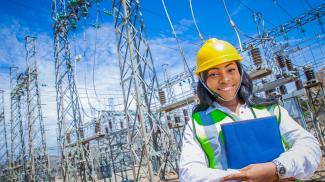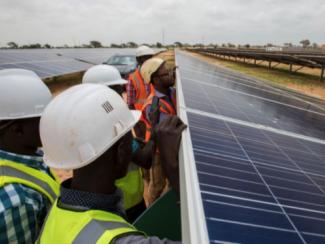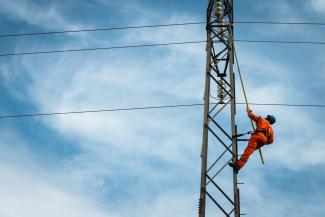Major steps have been taken to improve electricity access with renewable energy and energy efficiency policies, however significant effort is still needed to enable a move from policy to investment.
The lack of access to reliable electricity at an affordable price remains a key constraint to achieving broad-based economic development for the West African region. Years of uncoordinated planning and project implementation in the region’s power sector, plus a growing energy sector debt, lack of energy security, a fledgeling regulatory environment, and a lack of stable power grids have denied millions in the region of experiencing improved living standards.
USAID/West Africa’s support to the Economic Community of West African States (ECOWAS) and its specialized institutions aims to improve West Africa’s access to cheap, reliable, secure, and sustainable energy through increased private sector investment.
WEST AFRICA ENERGY PROGRAM (WAEP)
WAEP tackles long-standing constraints to access energy in West Africa by providing technical assistance, transaction advisory services, and targeted use of grant funding. The program seeks to increase power supply and access to reliable and affordable grid connected power by achieving the following outcomes over a four year period:
- Bringing 8,500 MWs of new generation capacity to financial close
- Supporting 4,000 kilometers of new transmission lines to commissioning
- Facilitating 3.6 million on-grid connections (including new and regularized)
As of March 2021, the program has successfully facilitated 645 MW of generation projects to reach financial closure. Through the program’s collaborative efforts with other international financial institutions, over $800 million has been mobilized for energy sector projects across the region.
To accelerate the launch of an interconnected regional electricity market (REM), WAEP teams work with the ECOWAS Regional Electricity Regulatory Authority (ERERA) and the West African Power Pool (WAPP). In the G5 Sahel region, a WAEP embedded advisor works with Power Africa partner, the African Development Bank (AfDB), to implement the Desert-to-Power initiative, which is working to harness the region’s high solar potential. This initiative is accelerating the deployment of innovative green off-grid and on-grid solutions, bridging the current electrification gap and reducing the financial burden the power sector places on national budgets across the region.
PROGRAMS IN SUPPORT OF ECOWAS
West African Power Pool (WAPP)
WAPP supports ECOWAS member states to integrate their national power systems into a unified, sustainable Regional Electricity Market (REM). USAID has provided immeasurable support to WAPP in the areas of program funding, capacity building, and pre-investment studies as ECOWAS works toward providing a stable and reliable electricity supply at an affordable cost.
WAPP has completed a number of training sessions for staff and engineers who are working on the Nigeria-Benin interconnection line. Staff of member utilities, Project Management Units, Ministries of Energy, WAPP Secretariat, and engineers now have improved skill sets in electricity market operations, public private partnerships and investments, and power infrastructure generation and transmission. WAPP is also building institutional capacity by training administrative and technical personnel of the WAPP Secretariat. These include courses on best practices, policy development, standard administrative and accounting processes and procedures, software application and study tours to America, Europe, and South Africa.
Because of USAID’s support, WAPP is now well resourced with a number of technically competent personnel who are playing various roles to help the region achieve a functional regional power market.
ECOWAS Regional Electricity Regulatory Authority (ERERA)
ERERA supports ECOWAS member states to regulate cross-border electricity exchanges, create an enabling investment environment for regional power projects, and provide technical assistance to national electricity regulators.
In partnership with the National Association of Regulatory Utility Commissioners (NARUC), ERERA is developing a Functional Model on System Reliability and the Regional Electricity Market and Gap Analysis Report, which will contribute to the enhancement of the regulatory framework for the regional power market. As a result of this support and those of other development partners, ERERA in collaboration with the ECOWAS West African Power Pool, successfully launched the first phase of the REM in June 2018, and developed Rules for Consolidation of Phase one.
ERERA also conducted complementary programs for national regulators in West Africa and an exchange program with various stakeholders in the electricity industry in the USA. The participants in the US exchange program were acquainted with good practices in international integrated power systems operations and management, including mitigation measures to reduce the risk of failure in the establishment of a REM.
ECOWAS CENTER FOR RENEWABLE ENERGY AND ENERGY EFFICIENCY (ECREEE)
ECREEE, through the ECOWAS Renewable Energy Fund (EREF), provides non-reimbursable grant contributions with other financial instruments to support the mobilization of private sector investment in renewable energy. USAID is supporting the third cycle of the EREF program, which was launched in 2019 and is currently being implemented in six West African countries. The program catalyzes investments in energy by facilitating access to finance for renewable energy projects, with a specific focus on clean energy mini-grids (CEMGs). CEMGs are recognized as an important technology option to promote access to affordable electricity in rural areas.
ECREEE has succeeded in connecting 200,000 rural households to 470 CEMGs, with a total installed capacity of 45 MW. It's regional efforts are supporting the commercial viability of CEMGs with EREF grants, contributing directly to the achievement of the rural renewable energy targets of the ECOWAS Renewable Energy Policy.

Photo credit: Power Africa

Photo credit: Xaume Olleros

Photo credit: Power Africa
